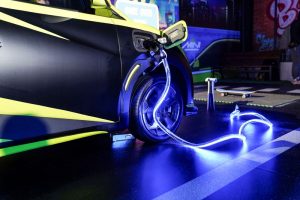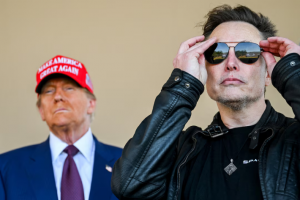Japanese auto giants Hyundai and Honda have tied up with American and European rivals in a bid take on Tesla’s Supercharger network in the United States.
The automakers – Hyundai and its Kia affiliate, Honda, General Motors, Stellantis, BMW and Mercedes Benz – will form a new company to build an electric vehicle (EV) charging network in the US, the companies said on Wednesday. A name for the venture was not announced.
Together, the unusual coalition of competitors, aims to roll out 30,000 chargers in North America, starting along major highways and in cities.
Also on AF: Volkswagen Buys $700 Million Xpeng Stake to Lift China EV Share
That would make their EV-charging network significantly bigger than that of Tesla, which currently has the largest web of fast-chargers with almost 18,000 Superchargers.
Tesla currently accounts for about 60% of total US fast chargers giving it competitive advantage over rivals. The automaker accounted for more than 60% of US EV sales last year.
The automaker’s lead in building out a network of chargers has also given it sway in setting standards, something rivals have viewed with concern.
Cost benefits
The seven automakers, which represent about half of US vehicle sales but a small share of the EV market, did not specify how much they would invest individually or collectively in the charging network.
They said, however, that they would be open to additional investment or participation from other companies, including outside the auto industry.
Industry executives familiar with the cost of chargers said establishing this venture could cost multiple billions of dollars.
“The investment will be far less through this partnership than building individual charging networks,” said Akshay Singh, a partner at consultancy PwC Strategy&. “They also get to control the customer experience and collect data.”
Fast-charging machines can cost anywhere from less than $100,000 to more than $200,000 for the most powerful versions.
Not easy to catch up
CEOs of the seven auto brands said a charging network built out like gas stations with restrooms, food service and retail operations would support a faster EV rollout.
Automakers, however, lack the necessary electricians or experience working with retailers, said Andres Pinter, co-CEO at installation and maintenance company Bullet EV Charging Solutions.
“It won’t be easy for the automakers to catch up,” he said. “But they do have boatloads of money to throw at the problem and should outsource that work.”
US EV credits benefit
The White House lauded the coalition announcement, calling it “an important step forward.” The Biden administration has set a target of hitting 500,000 chargers by 2030, an almost four-fold increase.
Tesla said earlier this year it would open part of its charging network to EVs from rivals in order to be eligible for a share of funding from $7.5 billion in federal subsidies.
GM, Mercedes and others have signed on to adopt Tesla-developing charging technology from 2025.
Hyundai, which said last month it was considering joining the technology, and the other automakers – Stellantis, Honda and BMW – have not committed to the Tesla technology known as the North American Charging Standard (NACS). The automakers have product plans that rely on a rival known as the Combined Charging System (CCS).
GM previously said it could save $400 million from getting access to Tesla’s network. On Wednesday, it said the new venture was part of its effort to reduce cost and “won’t change GM’s existing commitments or collaborations.”
The new charging company will support both charging standards but will compete with Tesla’s network.
The new venture would also compete against established charging companies, including Volkswagen’s Electrify America and EVGo.
Antitrust worries
Asked whether the new venture would raise antitrust concerns, a spokesman for the group cited the joint statement where the companies said it was subject to regulatory approvals.
Andre Barlow, an antitrust attorney with Doyle Barlow and Mazard, said the Justice Department would likely review the deal despite White House support.
A common concern with joint ventures is that a legal collaboration could potentially lead to illegal coordination, like price fixing or dividing up markets, he said.
“There are antitrust risks. You have seven car manufacturers that are going to be getting together in terms of this joint venture,” he said.
- Reuters, with additional editing by Vishakha Saxena
Also read:
Hyundai Reveals $28bn EV Push, China Factories Restructure
Hyundai, LG Eye $4.3bn US Battery Plant in EV Tax Credit Push
Honda Chief Backs EV Shift But Says Fuel Engines Won’t Vanish
Honda to Start Making New Hydrogen Fuel Cell System With GM
Tesla in Talks to Set up EV Factory in India – ToI
























